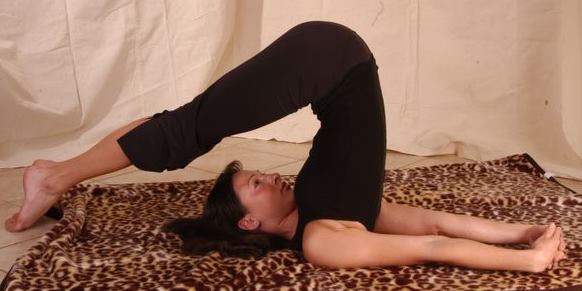BIO | SUN SALUTATIONS SERIES | ASANA FUNDAMENTALS | BANDHAS | YOGA
![]()
ARTICLE

Knitting goes feminist
By Holly HickmanThey sprawl about the Yarn Company store nearly every week now, their clever hands undulating and roving, looping yarn behind crossed needles, then around, then under, then through. Over and over they repeat the gesture, some gossiping as they knit, some pensive as they purl. Rows and rows snake forth, as the women inch out loping scarves, pert babies' caps and silky sweaters for Mamma. By the time they descend a darkened wooden stairwell and emerge again onto the pockmarked and sun-bright sidewalks of West Broadway, these knitting regulars display a calmness and renewal usually witnessed only at religious services, expensive spas, and yoga classes.

"It really is like the new yoga," says Barbara Adelstein, an avid knitter who frequents the Yarn Company regularly. "It's very calming."
Much has been written of knitting's elevation to yoga -- read: cult -- status. Celebrities such as Julia Roberts knit, and when the stars focus their wattage on something, the trend begins to spread faster than one can say "yoga." In Hollywood, however, a trend never stays completely true to the original. So, if knitting is indeed the "new yoga," then what, pray tell, is the new knitting?
Feminist knitting. That's right. Feminist knitting. An individual activity that easily lends itself to a group dynamic, knitting brings women of all professions, hierarchies and ages together in a way that dispels tensions often brought on by such trappings.
"It's about women supporting other women," says Adelstein. "We don't get enough of that."
Vickie Howell, owner of Rubygoesretro.com and a founder of the Los Angeles (and now Austin, Texas) knitting circle "Stich-n-Bitch," agrees.
"We're fortunate enough to live in the third wave of feminism, and to me that means choice. One of the things that we've lost is the community we used to get in the non-threatening forum of the knitting circle or quilting bee, because we have had to fight the fight" to get ahead professionally, she says from her Texas home.
She reminisces about her Los Angeles group, "professionals and moms and actresses and all spectrums of women, all talented and intelligent. There's something so pure about being able to create; we used to have these incredible conversations and really bounce ideas off each other. The knitting was almost inconsequential, but it brought us together as a community."
That community extends to the young. Teen magazines tout knitting. College campuses hold frequent knitting groups. There's even a Knits for Barbie Doll (Nicky Epstein) with patterns for "Scandinavian Ski Sets," "Wedding Dresses," and "Fabulous Faux Fur Coats" replete with leopard hats.
Brooke Wynkoop, a 31-year-old screenwriter, knows of many young women who make time for knitting despite high-powered jobs.
"It's very relaxing," she says of its appeal. "I think what I like most about it is that my mom taught me how to do it by putting her hands around mine, moving my hands with the needles. I like to share that."
To foster that sharing, tens of thousands of knitters congregate annually at "Knit-Outs" in New York, Los Angeles and Boston to share commonality, tips and wares, The popularity of groups extends to the micro level as well; whether in SoHo's Purl, a Chicago Wal-mart, or an Atlanta stich-n-bitch, small clusters of women find time to trade carpal tunnel for carpal therapy. Howell believes that the productive, creative activity of knitting is a perfect fit for the busy, Type-A woman.
"Modern women have a hard time settling down when there actually is downtime," she says. "Some need an outlet but can't sit still, and knitting's something for our hands to do that brings us together as women, then friends."
She says that women often knit according to their personalities. Highly stressed women tend to knit tightly spaced stitches, for example.
"I knew a high-strung, driven, obsessive compulsive movie producer who always had to have five projects going at once, and they all had to be difficult and intricate and hard. So, some people use the groups to cash out their brain and mellow out, and others don't," she said. Knitting is the "opposite of networking. In LA, everything's about networking, and they were looking for one place where they didn't have to find pretense."
For knitters who would rather empower themselves at home, the knitting guilds (for men only) that began in the Middle Ages now extend to the Internet. One can clutch a skein, surf a site and, within minutes, form a virtual knitting circle. One can download patterns, chat about drop stitches, and even book knitting vacations that offer private lessons on both knitting and on spinning wool straight off the llama's back.
The effervescent purler may also knit for a cause.
"A few weeks ago a woman was sitting in here knitting chemo caps for cancer patients out of the softest leftover chenille," says Adelstein from her usual Yarn Company perch.
Knitters can also donate their work to charities such as Warm Up America! which doles out afghans, sweaters, and scarves to the homeless.
"It's empowering to use something you do to help others," says Adelstein.
Some say that knitting also empowers by awakening entrepreneurial instincts.
"I'm starting a sweater line," says Lilly Rothbart, who learned to knit four years ago.
"Lilly's a wonderful designer!" pipes in Adelstein, who is knitting a metallic sweater.
Howell eschews knitting professionally, so that it remains her escape. Still, she champions knitting's capacity to empower, and to unleash creativity and variety.
"I hear from a lot of feminists a concern about women coming back into craft-based activities," she says. "Our mothers, our grandmothers, have fought for us to have the choice to stay at home with children if we want to, or to have our own career -- or to buy an expensive Prada bag and wear with it a scarf we knit."
